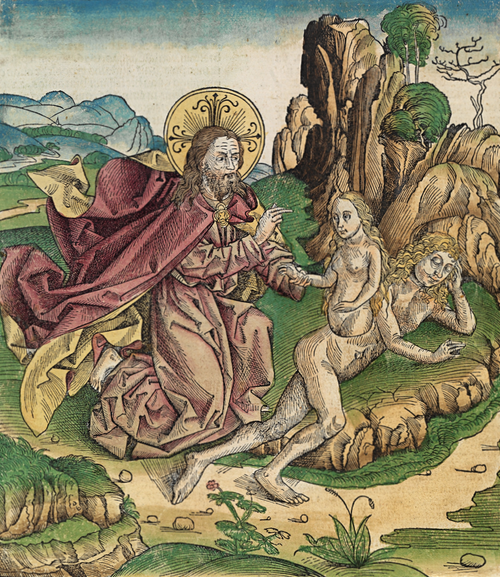
Published May 07, 2012
In his tragedy Phoenissae, Seneca wrote “Anyone can stop a man’s life, but no one his death; a thousand doors open on to it.” For Seneca, death was a part of life, a natural process that could not be avoided. And indeed, at the time, death pervaded the world through famine, disease, childbirth, and war. But something in humanity’s way of thinking about mortality and the world has changed in recent years. Death is now far off for us. So what, exactly, does this change mean? James Kugel, director of the Institute for the History of the Jewish Bible at Bar Ilan University in Israel and formerly the Starr Professor of Hebrew Literature at Harvard, felt this question was especially poignant after physicians diagnosed him with cancer a decade ago, and in his book In the Valley of the Shadow, he discusses and explains this change in the context of his work as a biblical and religious scholar. Kugel has written much of what is here elsewhere, most notably in other books: The Great Poems of the Bible and The God of Old. But here he attempts to expand upon his analysis, and does so with fascinating references to poetry, literature, psychology, science, the Bible, and religion.
Kugel identifies the change as a difference between the way we perceive our place in the world today and the way we perceived it in the past. For premoderns, “their own being was existentially small, dwarfed by all that was outside of them.” We used to think of ourselves as powerless before the great world, and Kugel believes this viewpoint was the foundation of religious belief. This view, however, sets him up against evolutionary theory. Evolutionary biologists have sought to explain the invention of religion in terms of Charles Darwin’s discoveries. Kugel frames their argument this way: Human beings needed to be wary of any person or animal approaching them for fear of being killed. They had to ask themselves whether this new being was friendly or curious, or had other, more nefarious, motivations.
“This involves making a rather complicated set of judgments,” writes Kugel, “first realizing that the advancing threat is a thinking agent, and then trying to think what he thinks, and even trying to think what he thinks I think.” Human beings then began to attribute thought processes and motivations to the environment. We assumed that some cognizant being made natural events work in certain ways for certain reasons. We could then appease these beings in order to protect ourselves from their wrath: Thus, the manmade creation of a supernatural being (according to certain evolutionary biologists) is a byproduct of “some useful feature of the evolving human brain—the hair-trigger agency detector that has otherwise proven so useful in our dealings with potential predators.”
Kugel asserts, however, that evolutionary biologists “walk right by the very state of mind” which he identified. This state of mind consisted of seeing one’s place in the world as short and insignificant, relative to nature and time. Implicit in this view is the admission that there is some power greater than one’s self, which made people far more “open to the great Outside, to You, in a way that modern man’s not.” And just as this assertion reinforced a religious viewpoint, so, too, did the religious viewpoint reinforce the idea of the individual as a small being. Kugel uses Judaism’s view of the soul as an example: Early Jewish sages thought of the human soul as a “deposit” given to us by God, to care for; our souls return to God every night when we sleep. A human does not even own his or her soul.
This concept of smallness is not just a monotheistic or Jewish value, either. Kugel cites the Polish journalist Ryszard Kapuscinski, who traveled to and wrote about sub-Saharan Africa in the 1960s. “Individualism is highly prized in Europe,” Kapuscinski asserted. “[I]n Africa, it is synonymous with unhappiness, with being accursed.” Kugel also cites Claude Lévi-Strauss’s similar observation: “In the Western view, the individual is a separate autonomous entity that comprises distinct attributes . . . and it is these attributes that are assumed to cause behavior. Further, there is a belief in the inherent separateness of distinct individuals.” Westerners view the individual as a being completely in control of his or her own life and most of the surroundings—as undeniably big. But many non-Westerners view themselves as small in the grand scheme of the universe, their lives having meaning only as part of the collective.
Kugel is fundamentally right that our views about ourselves have changed. Indeed, partly because of our scientific advances and understanding, “the world is generally far less ominous than it used to be, and … we humans are correspondingly bigger as a result.” We know how to administer medical care and plant trees, and we know how to travel into space, which makes the Outside “so much harder to see.” And this manifests itself in the way we relate to death. Kugel cites an example from the Bible, where Jacob tells his son Joseph that he will die but God will take care of him. Jacob then gathers his family and explains to them what will soon happen to them after he dies. It is “an orderly death,” explains Kugel. Today, however, our old and dying are put away in hospitals or hospices before their bodies are buried in coffins so that we rarely see them. “Death has become taboo in America,” writes Kugel, “because it spoils the myth of human control and our new, bigger selves.” And our unrestrained faith in science is partly responsible for this change. Sam Harris tells us, in The Moral Landscape, that science is so powerful that it can determine morality. William Osler, the famous Johns Hopkins physician of the early 20th century, argued that medicine should be viewed as “man’s redemption of man.” This view surely flatters the potential of science, but as prominent as it may be now, the old view of humans as small in the grand scheme of the world has not fully disappeared, nor is it solely the province of the religious and non-Westerners.
The late Christopher Hitchens explained his experience of a cancer diagnosis in this way: “To the dumb question ‘Why me?’ the cosmos barely bothers to return the reply: Why not?” And Richard Dawkins, in The God Delusion, makes a similar point about each human being’s relative smallness: “We are staggeringly lucky to find ourselves in the spotlight. However brief our time in the sun, if we waste a second of it, or complain that it is dull or barren . . . couldn’t this be seen as a callous insult to those unborn trillions who will never even be offered life in the first place?” These comments suggest that, in the realm of this world, we are small compared with the forces of nature and evolution, at work for millions of years.
But James Kugel does not want to claim that Hitchens’s view, or Dawkins’s view, or the biblical view, is better than the individual-centered view; they are just different: “It is not a matter of right and wrong, but of different perspectives and . . . the state of being and the way of perceiving that go with them.” We have outgrown our small selves, he writes, but “our new, big ones have brought us to a rather unreal sense of the shape of our own existence.” We have not outgrown our old selves. The more we know, the more mysterious the world becomes. Now we know that our planet is comparable to a cell in the human body, vastly overwhelmed by the sheer volume of galaxies, solar systems, and stars. Now we understand that there is no real control center in the brain (as Kugel points out), so our consciousness is an amalgamation of different signals of different strengths that are a product of genes and outside stimuli.
Our world is even more complex, despite having closed many of Seneca’s thousands of doors that open onto death—and this is good. A smaller view of ourselves keeps other doors open, which take us into a world of infinite possibility that cannot always “be seen by the eyes or heard by the ears.”











